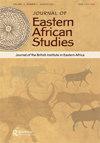融合主义与拒绝主义:重新审视肯尼亚沿海地区伊斯兰激进主义的历史
IF 0.6
3区 社会学
Q2 AREA STUDIES
引用次数: 0
摘要
在20世纪80年代末和90年代初,肯尼亚沿海地区见证了伊斯兰激进主义的兴起。本文回顾了这一崛起,追溯了两个截然不同的政治-宗教团体的历史,他们试图解决肯尼亚穆斯林社区的历史边缘化问题:位于蒙巴萨的肯尼亚伊斯兰党(IPK)和南部沿海的Ansar Sunnah运动。IPK接受了肯尼亚的民族国家,并试图通过选举过程赋予肯尼亚的穆斯林少数民族权力,而“安萨里派”则推行了一种从根本上反对民主和传统国家的拒绝主义议程。重新调查这两个对立项目的起源和演变,我们的文章提供了两个基于实地工作的贡献,借鉴了关键的线人访谈。首先,我们要解决几个历史上悬而未决的问题,这些问题涉及像哈立德·巴拉拉和阿卜杜勒阿齐兹·里莫这样的杰出政治-宗教企业家的传记。其次,我们提供了一个对应物,越来越多的文献集中在逐渐出现的沿海圣战网络。虽然我们不否认这个网络的重要性,但我们表明,圣战主义在当地的兴起伴随着远离暴力和排外主义的同样重要的温和进程。总的来说,我们的文章因此强调了肯尼亚沿海地区和更广泛的东非地区伊斯兰激进主义的多面和非线性动态。本文章由计算机程序翻译,如有差异,请以英文原文为准。
Integrationism vs. rejectionism: revisiting the history of Islamist activism in coastal Kenya
ABSTRACT
In the late 1980s and early 1990s, Kenya’s coastal region saw the rise of Islamist activism(s). Revisiting this rise, this article traces the history of two contrasting politico-religious groups seeking to address the historical marginalisation of Kenyan Muslim communities: the Mombasa-based Islamic Party of Kenya (IPK) and the southern coastal Ansar Sunnah movement. While the IPK accepted the Kenyan nation-state and sought to empower Kenya’s Muslim minority via the electoral process, the ‘Ansaris’ promoted a rejectionist agenda fundamentally opposed to democracy and the conventional state. Re-investigating the origins and the evolution of these two antithetical projects, our article provides two fieldwork-based contributions, drawing on key informant interviews. First, we tackle several historiographically unsettled questions concerning the biographies of prominent politico-religious entrepreneurs like Khalid Balala and Abdulaziz Rimo. Second, we provide a counterpoint to a growing body of literature focussing on the gradual emergence of a coastal jihadist network. While not denying the significance of this network, we show that the local rise of jihadism has been accompanied by equally important processes of moderation away from violence and exclusivism. Overall, our article therefore underlines the multi-facetted and non-linear dynamics of Islamist activism in coastal Kenya and the wider East African Region.
求助全文
通过发布文献求助,成功后即可免费获取论文全文。
去求助
来源期刊

Journal of Eastern African Studies
AREA STUDIES-
CiteScore
3.30
自引率
7.10%
发文量
12
期刊介绍:
Journal of Eastern African Studies is an international publication of the British Institute in Eastern Africa, published four times each year. It aims to promote fresh scholarly enquiry on the region from within the humanities and the social sciences, and to encourage work that communicates across disciplinary boundaries. It seeks to foster inter-disciplinary analysis, strong comparative perspectives, and research employing the most significant theoretical or methodological approaches for the region.
 求助内容:
求助内容: 应助结果提醒方式:
应助结果提醒方式:


